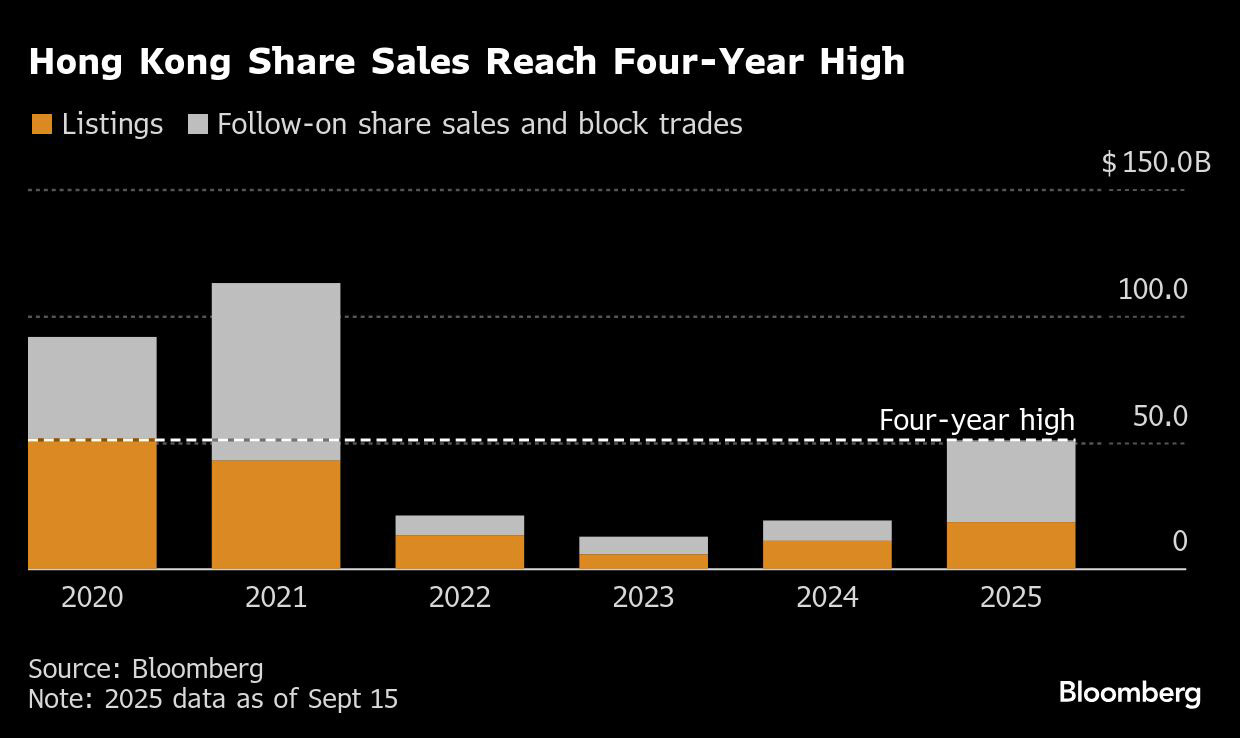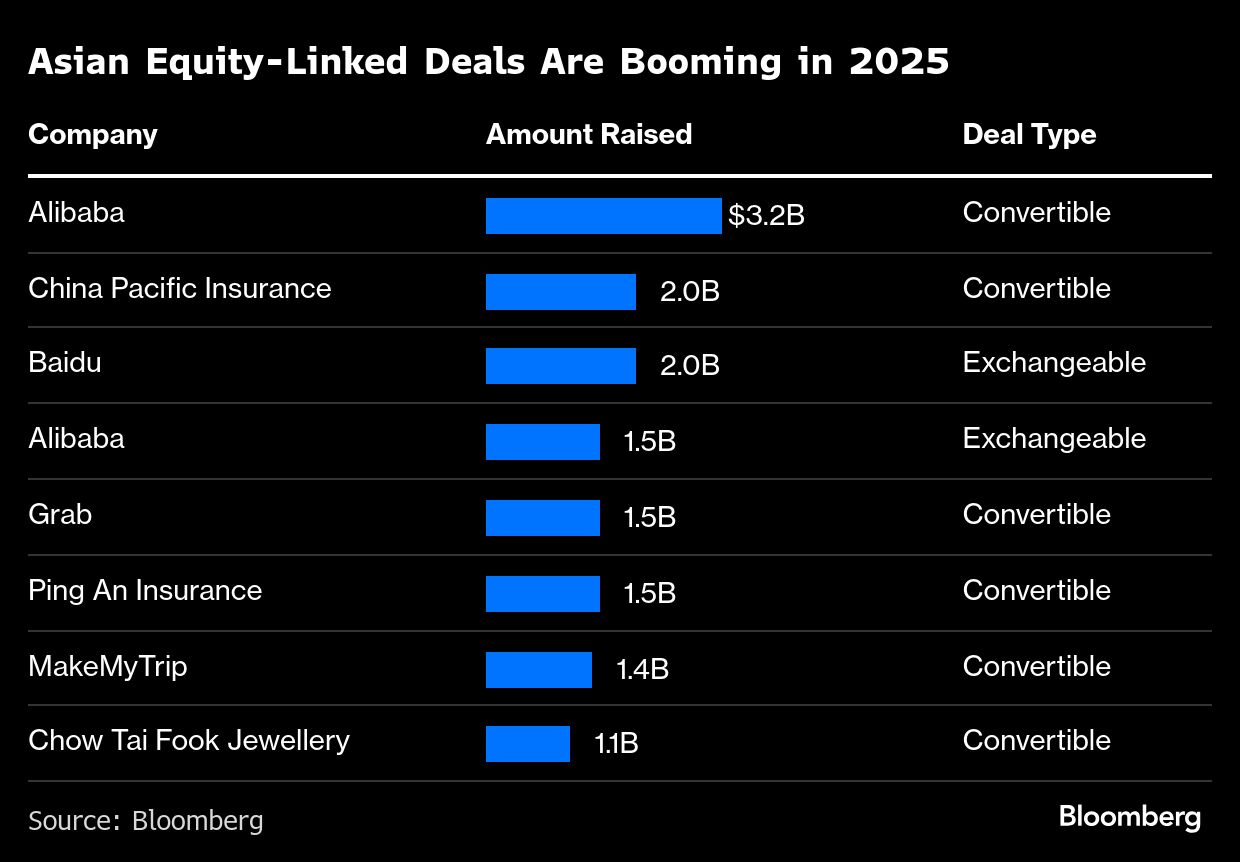
Bankers in the Hong Kong Special Administrative Region have ended the summer lull with a bang, closing billions of dollars of capital market deals as the Chinese mainland’s corporate giants rush to raise cash.
So frenetic is the pace that three Hong Kong-listed companies sought to raise $6.2 billion within just 12 hours last week. Alibaba Group Holding Ltd issued $3.2 billion in a blockbuster sale of convertible bonds, a type of debt that can turn into stock. China Pacific Insurance (Group) Co raised $2 billion from its own convertible notes. Electric-vehicle maker Nio Inc nabbed $1 billion through a share sale.
ALSO READ: Hong Kong: IPO champion of the world
Bankers say there is plenty more to come. After a brief slowdown during the summer months, equity capital markets insiders are bracing themselves for a raft of billion-dollar deals. Initial public offerings, secondary share sales and equity-linked transactions are all poised for a boom period.
“It’s been a pretty hectic couple of weeks, and I suspect that it’s only going to continue,” said John Huang, head of equity capital markets for Asia at HSBC Holdings Plc.

The latest supply will add to what has already been a blistering pace of dealmaking in the city this year. Hong Kong share sales — including initial public offerings, placements and block trades — have raised $51 billion since Jan 1, putting them on track to close the year at a four-year high, according to data compiled by Bloomberg.
Sales of bonds that can be exchanged for stock by mainland companies have raised more than $33 billion globally so far in 2025, eclipsing annual proceeds in each of the past two years.
The pace of issuance still isn’t enough to meet demand. Fund managers, finally enjoying a period of optimism for the SAR’s stock market, are rushing to place orders for share sales and convertible bonds. The scale of demand means many investors are left disappointed once these deals are allocated.
Convertible bonds
Mainland companies are leading the charge, and are likely to push Asia’s equity-linked bond issuance to multi-year highs as they raise cash for overseas expansion or bets on artificial intelligence. These bonds can offer much cheaper funding than traditional debt — Alibaba and China Pacific’s recent convertible notes came with zero coupons — and they also benefit when stocks are moving quickly.
Hong Kong’s benchmark Hang Seng Index is up more than 30 percent this year, despite a plunge in April that wiped out most of its earlier gains.
ALSO READ: Hong Kong regaining status as premier IPO market
Mainland tech stocks have been even more volatile: Alibaba’s shares jumped 15 percent last week alone, while shares of battery giant Contemporary Amperex Technology Co Ltd soared as much as 10 percent on Monday after being upgraded by JPMorgan Chase & Co.
Continued volatility “has urged more issuers to accelerate their capital-expenditure plans to ensure they take some money off the table while the market remains very supportive,” said Brian Chau, co-head of Asia equity-linked deals at UBS Group AG.
Investor appetite for these deals was clear when Alibaba and China Pacific came to the market. Both deals were subscribed multiple times despite having excluded sales to certain US onshore investors under their so-called Regulation S format, according to people familiar with the matter.
The arrangement, which exempts some US regulatory filing obligations and so makes execution faster, was also used by CATL for its $5.2 billion listing this year.

More companies are looking to tap the equity-linked market for the first time as their peers have raised funds that way, said Rob Chan, Citigroup Inc’s head of Asia equity capital markets syndicate. That is encouraging more executives to grasp the technicalities of a convertible-bond deal, which typically involves a hedging mechanism, Chan added.
Still, there are some hurdles for equity-linked supply. The Federal Reserve is widely expected to cut interest rates on Wednesday, and recent data has fueled bets on several more cuts to follow. Lower interest rates make conventional debt cheaper for companies, eroding the appeal of convertible bonds.
“If long-term rates come down quicker than expected, then some potential issuers may consider straight bonds more seriously,” said Akshay Sawhney, co-head of Asia-Pacific equity capital markets at Bank of America Corp.
First timers
But bankers aren’t just relying on convertible bonds. While big first-time share sales in the Hong Kong SAR so far this year have mostly come from companies whose stock already trades in the mainland, the pipeline is building for mainland companies looking to go public for the first time.
Leading the pack is the gold business of Zijin Mining Group Co, which this week began gauging investor interest for a Hong Kong IPO that could fetch more than $3 billion, while automaker Chery Automobile Co’s IPO may raise about $1.5 billion.
READ MORE: Golden gong rings in Hong Kong IPO frenzy
Hong Kong listing proceeds could more than double to a four-year high of $26 billion, according to Bloomberg Intelligence, which raised its estimates this month.
There has also been a flurry of funding in the conventional bond market. Mainland technology and mobile gaming giant Tencent Holdings Ltd has named banks for its first such offering in four years, with a plan to sell offshore yuan bonds. That followed a recent 4.4 billion yuan ($618 million) deal from Baidu Inc, another tech giant.


